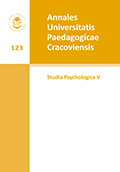Theory of Mind in autism: more variations and more complexity than once believed
Theory of Mind in autism: more variations and more complexity than once believed
Author(s): Miklós GyöriSubject(s): Psychology
Published by: Wydawnictwo Uniwersytetu Komisji Edukacji Narodowej w Krakowie
Summary/Abstract: The present paper is an overview of our research from the last few years, which was aimed at getting a finer image of Theory of Mind impairment and its consequences in autism. Theory of Mind is a crucial human cognitive ability to understand and predict others’ behaviour by attributing mental states to them. This ability is, as it is well-known, developmentally impaired in autism, but relatively little is known about the individual varieties and the precise nature of this impairment. The studies summarised in this paper were aimed at three issues: (1) if those individuals who are able to solve Theory of Mind problems indeed have a Theory of Mind ability, (2) how existing Theory of Mind abilities are related to linguistic abilities and to social-communicative symptoms in autism, and (3) if the existing Theory of Mind competence in autism is stable over time or shows atypical fluctuation. In order to solve these issues we applied various methodologies of cognitive psychology, including experimental, psycholinguistic and psychometric methods. Our findings show that Theory of Mind ability shows a striking variation in high functioning autism, from deep impairment to relatively complex understanding of minds, including compensatory strategies in some cases. Also, we found that language and Theory of Mind show a very specific relationship in autism, and existing Theory of Mind ability shows remarkable stability in some subjects, while others are more unstable in this sense. In sum, these findings indicate that the impairment of Theory of Mind ability in autism is a far more complex issue than once believed, and calls for further intensive research.
Journal: Annales Universitatis Paedagogicae Cracoviensis. Studia Psychologica
- Issue Year: IV/2011
- Issue No: 1
- Page Range: 130-144
- Page Count: 15
- Language: English

